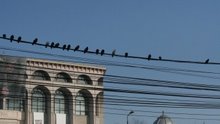The allusion to the song with the vegemite song I come from the land Down Under is intentional. Before I will acquaint you with the wonders of Romanian, this is an appeal to pity the anthropologist, deprived of food she loves, and send her a jar of that disgustingly salty marmite. I have had cravings for weeks now, not at the stage of dreaming of it just yet (like Pele did of meat in India), but getting close...
Romanian had me fooled, looking and sounding a lot like a Latin language. I am still struggling with speaking it, possibly because it creates interference with languages I am familiar with. The grammar is partially in line with Latin, having a vocative case, as well as genitive and dative inflexions, and accusative case is also marked. So it is a synthetic language in some grammatical features. In others, it is something altogether different. There are a lot of formulations that inverse the whole idea of subject-owning-action, and would be literally translated as 'to me is', e.g. to me is hunger, to me is longing. In terms of agency (I know it is a term used excessively in British social science) it has all kinds of fascinating repercussions. Another maddening thing is that the syntactical constructions often require the double expression of the direct or indirect object. This means that the nouns or their substitutes carrying the lexcial meaning are duplicated by a so-called 'unstressed' form of the personal pronoun in the accusative or dative, which acts as a kind of early warning system for the actual pronoun. I think it is very stressful indeed though. As far as I understand this feature is necessary because the word order is relatively free, due to the inflexions carried by the cases, but it appears a redundant feature nevertheless, in a lot of examples. Then again, me not liking it will not make it go away. Romanian is the only Romance language that has kept the neuter from Latin, but which now presents a nice levelling mechanism, by which the neuter noun takes a masculine modifier in the singular and a feminine one in the plural.
As far as vocabulary is concerned, Romanian presents borrowings from what is popularly called 'Dacian' (e.g. brânză – cheese, and vărză - cabbage). The substratum then used to be Dacian and the superstratum Slavic (Bulgarian, Russian, Serb..., e.g. sfat, sfaturi – advice, val, valuri - wave). In the course of time Turkish (e.g. geam, geamuri - window glass; one more great word is neskedil, denoting a person with an embroidered heart), Germanic (aparat, aparate), French (fenomen, fenomene), Hungarian (pahar, pahare - glass), Greek (scop, scopuri - goal) borrowings happened. Due to nineteenth century nationalist efforts, 'intellectuals' latinised the language, reacting against the Slavic elements in it. What you read in the papers (or on the internet on Romanian-language BBC) is a lot more Latin-based than the thing they actually speak here, much to my frustration at times. I suppose the situation, historically, is somewhat (broadly) comparable to how, in the British Isles, words of Germanic origin were paralleled with Norman French words, and reflected a sharp social rank differentiation.
As a continuation of my love for words, their sounds and usage, here are some of my Romanian favourites. I like the word a ciufuli (pronounced with an Italian sonority of the letter c as tʃ in front of i), meaning to dishevel. Also a great word a toarce, which means both to spin and to purr. See here for speculations on possible origins of a dezmierda, meaning 'to caress'.
A great pair of words, used in all kinds of specific senses would correspond to the French se débrouiller and its opposite s'embrouiller, in English to manage in a resourceful way: a se descurca, also with the literal meaning of disentangle (much nicer than 'to get on top of things'). It is also used for a crafty person who knows how to use the 'system' for her own ends, and who is well-networked. The opposite a se încurca means to tangle, to trouble, to flummox, to confuse, to puzzle, to encumber. I find the image of the tangle very appropriate to describe both the way in which we create relationships in the world and the way in which we navigate in labyrinths that never fully reveal themselves. As we âdisentangle ourselves from one thing, we are already getting caught up in the next one. And no, I am not talking about Geertz's / Weber's 'webs of significance'.
Teaching and learning, on the other hand, means a preda and a învața, and, for some obscure reason I keep confusing them. Embarrassing when you want to use one, and accidentally say 'I want to teach how it works', when actually you have no idea, and want to learn how it works. Being an anthropologist away from home means to continually fall prey to moments of shame, awkward silence, and bad grammar.
Last week at some point I had obviously cracked a magnificent joke as my host burst into a laugh so loud it made the walls shake. My problem was that I was an innocent comedian, not having grasped what I had said. It turned out to be something about a maimuță (monkey) – I had gotten the word wrong from the start, and have been mistakenly calling monkeys for a while now muță, and I was quite puzzled as to why something should be 'more monkey' than something else... hard to explain out of context, but made me happy to see her happy.
Subscribe to:
Post Comments (Atom)








No comments:
Post a Comment